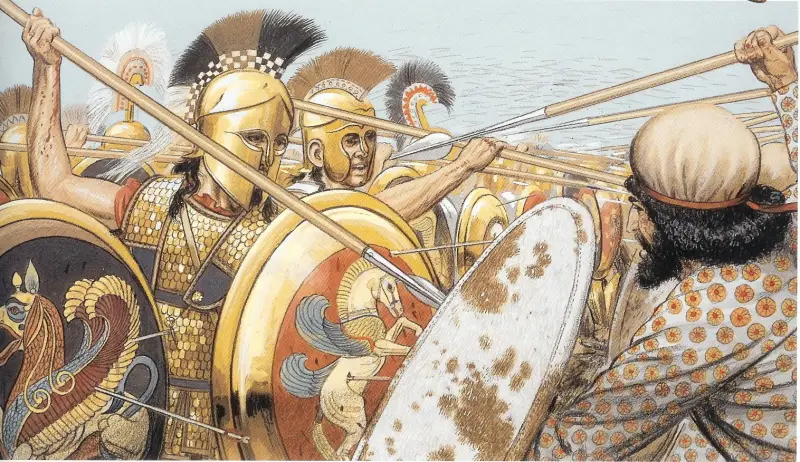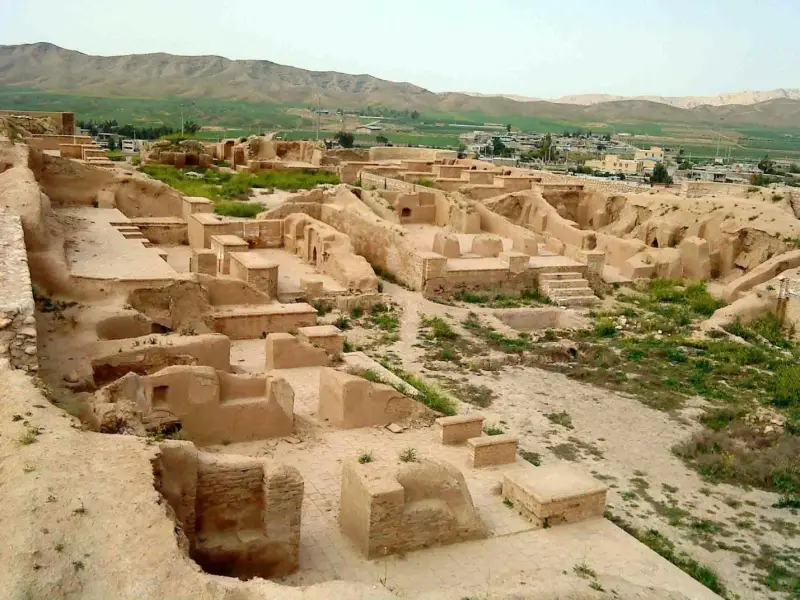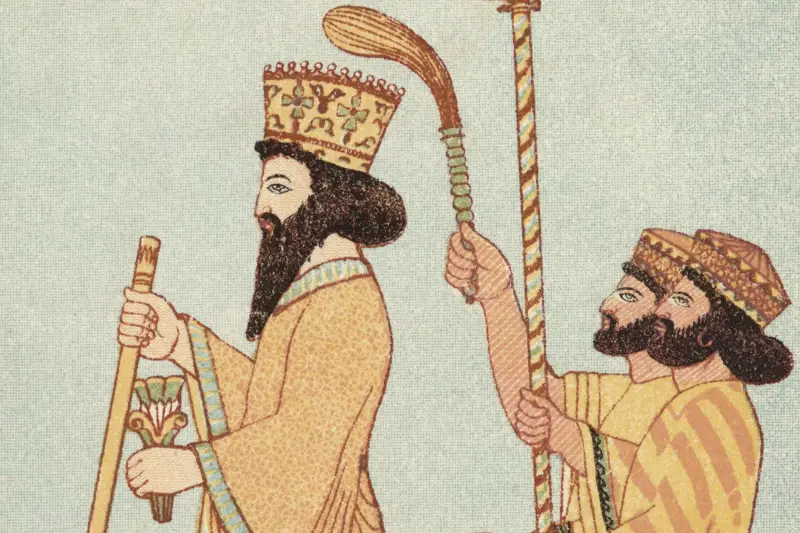Marathon: background, battle and stereotypes

One of many paintings demonstrating a pro-Greek view of the Battle of Marathon and hardly reflecting its realities
Heirs of Elam
In the article "Iran and Armenia in context stories and modernity“I promised to talk about the Greco-Persian wars not from a pro-Hellenic position.
In this article we will talk about the background Battle of Marathon and some details of himself, trying to dispel the stereotypes instilled from school.
The Persian state can be called the heir to the most ancient civilizations of Mesopotamia, ranging from Sumerian-Akkadian to Assyrian-Babylonian. Just like she is the heiress of the Elamites who lived in the Iranian plateau, who created - wrote the outstanding Soviet historian-orientalist M. A. Dandamaev - one of the most ancient and original civilizations, which had a great influence on the material and spiritual culture of the Persians.
Accordingly, culturally, Persia stood an order of magnitude higher than the Greek city states, which were warring like spiders in a jar. And in the religious too. For the Persians did not practice human sacrifice, unlike the Greeks - just remember the Battle of Salamis in 480. And the unrefined story of Hercules, with his sacrifice of his own children, can tell a lot about the beliefs of the Hellenes.
The Persians, if I’m not mistaken, forbade those who served in their navy to the Phoenicians, human sacrifices associated with the cult of Baal included the killing of infants.
And if we compare the religious views of the Persians and Greeks, then the former, albeit with a number of reservations, can be called monotheists, while the latter worshiped grumpy, cruel and depraved gods, and when Socrates doubted the need for this, he was simply executed. The verdict was passed by a democratic majority.
The Achaemenids did not show any interest in conquering Hellas, at least at the turn of the XNUMXth–XNUMXth centuries. BC. In a sense, they can be compared with pre-Qing China, around which lay poor lands that virtually excluded expansion against them. Unless the army of the Tang Empire undertook campaigns in the direction of the Tien Shan to ensure the safety of the Great Silk Road.
The same goes for Greece regarding the richer Persia. That is why its kings had little interest in mountain gorges and goatherd paths.
It is noteworthy that the Hellenes recognized their own poverty, in comparison with the neighboring great power. Thus, one of the Athenian ambassadors to Persia, Epicrates, once joked in the Ecclesia (People's Assembly) that instead of nine archons, it would be better for the demos to annually elect nine ambassadors to the king from among the poor citizens, so that the latter would become rich from the generosity of the Persian ruler, who invariably bestowed gifts on the ambassadors.
Here is an example, however, relating to the period preceding Alexander’s campaign and given in one of the works of the ancient historian E.V. Rung:

Susa was once the capital of Elam and the ancestral home of the Persians; the city was also one of the capitals of the Achaemenids
Impressive, you'll agree. And it contrasts greatly with the murder of both the Athenians and Spartans of the Persian ambassadors in 490 BC, which, presumably, also represented a kind of sacrifice.
The above-mentioned author, describing the travel routes of the Hellenic ambassadors to Susa, provides evidence of the civilization of the Persians:
At the same time, the Persians knew little about the Greeks living outside their power, as evidenced by the question of the satrap of Sardis and the nephew of Darius I (522–486) - Artaphernes, who received Athenian ambassadors in 507 BC, asking for protection from Sparta, whose envoys visited the city forty years earlier. Actually, the question concerned the location of Athens. The Spartans were asked the same thing.
The treachery of Athens and the generosity of the Persians
The Persians promised protection in exchange for, in modern terms, recognition of vassalage expressed in the formula of land and water. The ambassadors agreed. But eight years later, the Athenians supported the anti-Persian uprising in Ionia, located in the west of Asia Minor, which in Susa was rightly regarded as treachery, and they saw blasphemy and barbarity in the burning of temples.
An interesting detail: the Ionian Greek colonies were culturally superior to their own metropolis; I think, not least due to the influence of Lydia, whose kingdom was conquered by the Persians in the XNUMXth century.
The uprising looks all the more absurd - as, by the way, Herodotus found it - in the light of the increased opportunities for Ionian trade with neighboring and even distant countries under the scepter of the Achaemenids.
Yes
In general, the support of the rebels by Athens, who violated the concluded treaty on their own initiative, outraged Darius I. And restoring justice through a punitive expedition seemed to the king a natural step. Although after the suppression of the uprising, the Persians generally refrained from taking revenge on the Ionians.

Darius I
Moreover, Darius I showed himself not only to be a generous person, within the framework of the realities of the time, but also demonstrated the talent of a strategist and politician. To provide a rear in the form of the newly pacified Greek cities of Asia Minor, he replaced tyranny with democracy in them, so as not to provoke discontent among the Ionian Hellenes, retaining their loyalty in anticipation of the operation against Athens.
Battle of Marathon - number of sides
But since it was precisely punitive in nature, the forces allocated for it were insignificant. The famous military historian G. Delbrück estimates the number of Persians at 4–6 thousand soldiers, which included from 500 to 800 horsemen.
Agree, it’s not very good for a campaign of conquest, as they sometimes write, which requires a dispersion of forces to ensure communications, control occupied territories, solve logistics problems and is designed to take into account non-combat losses, which until the XNUMXth century in all armies, as a rule, exceeded combat ones.
Their enemy fielded about 9 thousand hoplites (8 thousand Athenians and 1 thousand Plataeans). Hardly any more. For sixty years later, at the beginning of the Peloponnesian War, Thucydides determines the size of the Athenian army - 13 thousand hoplites. Both the mobilization capabilities and financial resources of the largest Greek polis at that time, which headed the Delian (Maritime) League, were significantly higher than in 490 BC.
And yet, in this situation, the Persians, led by the commander of the Median fleet Datis and the son of the Lydian satrap who led the land army (not to be confused with his namesake mentioned above, who was Darius I’s nephew) Artaphernes, attempted to take Athens.
Perhaps, in addition to the direct order of the king, the matter also has to do with Hippias, the former tyrant of Athens, who was expelled from the city in 510 BC and found refuge with the Achaemenids. It was he who proposed a landing in the Marathon Valley, which, according to him, was not guarded and located 40 km from the city. That is, the bet was placed on the swiftness of the attack and the alleged inability of the Greeks to quickly gather troops, which were a civilian militia.
However, as you know, the army of the strategist Miltiades was already waiting for the Persians. Given the numerical superiority of the Hellenes, Datis and Artaphernes had only two options.
First: hastily board the ships and try to land in another, more favorable place, taking into account the lost fact of surprise. In addition, when loading onto ships, the Persians were under the threat of attack from the Athenians located close to them.
The second way is to strike first, without waiting for the enemy to strengthen due to the approach of the Spartans, which the Persian commanders were aware of. The delay of the Lacedaemonians, who postponed the campaign until the full moon, played into their hands.
Presumably, a significant argument in favor of the attack was the absence of defeats from the Hellenes.
Persians: defeat, but not defeat
In a word, the Persians decided to fight.
G. Delbrück believes that when they approached a distance of 100–150 steps, the Athenian commander ordered the phalanx to attack. The Persians apparently withstood the first blow and may even have pushed back the center of the phalanx, but they yielded on the flanks and, forced to retreat, began loading onto ships. Considering that it did take place, the victory of the Greeks cannot be called absolute.
The main component of their success: the phalanx is a tactical formation, in the case of providing the flanks with either cavalry or a natural obstacle, absolutely insurmountable, largely due to the specifics of the weapons and protection of the warriors of the Achaemenid power, and not only them.
Improved by Philip II (382–336 BC), the phalanx remained invincible for other forms of tactical formation until the battles of Kinoxephali and Pydna - respectively in 197 and 168 BC, when it was crushed, and even then with difficulty , the Romans, with their more advanced formation of troops and tactics of use.
As for providing the Athenians with flanks, in the absence of cavalry, Miltiades solved this problem by erecting an abatis on one of them, which further narrowed the kilometer front. Another thing is that the fence was erected for defensive purposes; when the phalanx moved, its flanks most likely became open to attacks by the Persian cavalry, which, however, was numerically insignificant and therefore unlikely to be able to change the course of the battle and seriously shake the formation of the hoplites.
At the same time, Greek sources do not report the capture of enemy horses, that is, the horsemen, due to their small numbers, either did not participate in the battle at all, or were too tough for the Greeks. The latter is not surprising: the phalanx, as we have already noted, is strong as a closed formation, representing a monolith.
The capture of horses required its violation, which could lead to defeat, which, in fact, befell the Macedonians in the mentioned battles.
And the individual combat training of the Persian horseman was higher than that of the polis militia.
Another reason for the defeat of the Persians was the peculiarities of their weapons and protective armor. Here is how they are described by one of the best specialists in the military history of antiquity, P. Connolly:
Their weapons consisted of a short spear, about two meters long, a long compound bow, which was accompanied by reed arrows with bronze tips, and a dagger worn on the right side. The elite of the Persian army were the king's personal bodyguards, ten thousand "immortals", who were called so because their number always remained the same. Their personal equipment differed from the weapons of other Persians only in the richness of its decoration. The Persian cavalry were armed exactly like the infantry, except that some had metal helmets.
Let us add: G. Delbrück believes that the arrows of the Persians rarely killed hoplites well protected by armor. It is also worth taking into account the 2-meter, according to other estimates - 3-meter spears of the hoplites, which pierced the relatively weak armor described above by P. Connolly. And this is another explanation of the reason for the success of the Athenians and Plataeans on their memorable September day.
That's why I wrote above: perhaps the Persians pressed the center of the phalanx, which I had to read about, but which I doubt.
Given the mentioned length of the spears and the comparative weakness of the striking force of the Persians, due to their small numbers and the imperfection of offensive-defensive weapons in comparison with the hoplites, I admit that Artaphernes’ warriors did not overcome the wall of spears at all.
Those insignificant and recorded losses of the Hellenes - 192 people (Persian losses are unknown to us, and the figures given by the Greeks should not be taken into account) may be associated with the actions of archers and the battle near the ships, when the Greeks tried to prevent the loading and even captured seven triremes.
After defeat (but not defeat!) the Persians sailed to their homeland. G. Delbrück considers the tales about their desire, rounding Cape Sounion, to take Athens, to be empty gossip.
Darius I began to prepare a new campaign, but the anti-Persian uprising in Egypt that broke out in 486 BC confused his plans.
The next invasion, memorable by Thermopylae and Salamis, took place only ten years later. But that's another story.
The fate of Miltiades turned out to be sad: he led the siege of the Persian island of Paros, which turned out to be unsuccessful, and was forced to retreat. The Athenians accused him of receiving a bribe from the Parian king. Moreover, during the trial, the commander’s defense was represented by his brother - Miltiades himself was being treated for wounds.
As a result, the court, not finding the hero of Marathon worthy of the death penalty, sentenced him to a fine. Miltiades did not have the necessary amount, and he ended his days in prison. Democracy...
Использованная литература:
Dandamaev M. A. Political history of the Achaemenid state. M.: Nauka, 1985.
Delbrück G. History of military art within the framework of political history. Volume 1. Ancient world. St. Petersburg 1999.
Connolly P. Greece and Rome The evolution of military art over 12 centuries.
Xenophon. Cyropedia / Translation by V. G. Borukhovich, E. D. Frolov; the publication was prepared by V. G. Borukhovich, E. D. Frolov, M.: Nauka, 1976.
Martin T. Ancient Greece. From prehistoric times to the Hellenistic era. M., 2020.
Nepos Cornelius. About famous foreign commanders. Miltiades // https://ancientrome.ru/antlitr/t.htm?a=1479000100.
Rung E.V. Stay of Greek city-states in the Achaemenid state // https://cyberleninka.ru/article/n/prebyvanie-grecheskih-poslov-v-ahemenidskoy-derzhave.
Information